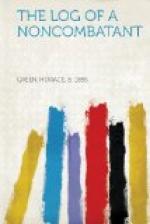Because a large part of the railroad line between Eschen, Cappelen, and Antwerp had been torn up, because there would be many hold-ups, and because I couldn’t speak a word of Flemish, I decided against the overland route. Hearing, however, that L. Braakman & Company, a grain and freight shipping concern, were running down barges from Rotterdam, I got a Belgian friend to call them up on my behalf. The result was a flat throw-down: without General de Guise’s sanction I might not even cross the gangplank.
Nevertheless, I went to Rotterdam, crossed the river basin to the island from which the Braakman boats ran, and there saw a director of the company, who, fortunately, could speak both English and Flemish. He took me to the captain of the river barge, a low craft that looked a cross between a tugboat and a Hudson River scow. In less than three minutes my case was disposed of. Verdict: “C’est absolument defendu.” It was time for a little “bluff.” An hour later I returned with a new proposition, having in the mean time telegraphed Mr. Diederick either to meet me at the pier at Antwerp or to send a military permit. Displaying a copy of this telegram I suggested that I be allowed to board. If there was any one at Antwerp to meet and vouch for me, well and good; if not, they were at liberty to ship me back. That was my proposition.
“He may go as far as the border patrol, fifteen miles east of Antwerp,” the captain said to my interpreter. “If the river sentries permit it he may then go as far as the Antwerp pier, but he cannot land.”
We cast off Sunday, October 4th, at 6 A.M. The little Telegraaf III poked her nose through the blue-gray haze of a chilly October morning while the muddy waters of the Meuse slapped coldly against her bow. I stamped the deck a few times, wondering if there was an English-speaking soul aboard, and leaned up against the engine room until the odor of coffee and bacon lured me to the fo’castle hatch. A purple-faced giant, with thick lips that met like the halves of an English muffin blocked the companion-way.
“’Jour,” growled the face as though it hated to say it, then pointed to the food and cognac. This was Monsieur le Conducteur, ship’s cook, barkeeper, and collector of fares.
In the center of a dark cabin, littered with charts, pails, and Flemish newspapers, was a kitchen table. Now and then a smoking oil lamp flared up to throw a light on the faces of my fellow-passengers, five of them in addition to the captain and Mons. le Conducteur. They were, as I discovered later, Mons. A. Albrecht, a leading alderman of Antwerp and a friend of Mons. Vos, the burgomaster; a light-haired Belgian piano salesman who could speak five languages; Mile. Blanche Ravinet, of looks beautiful and occupation unknown; and two others. From the suddenness with which the conversation stopped, I judged they had been discussing “ze American.” They were welcome to say what they liked barring the word “spion.”




